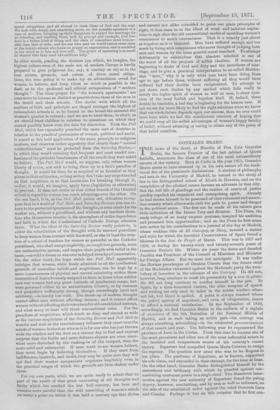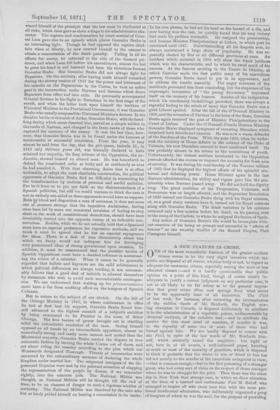GONZALEZ BRABO.
THE news of the death at Biarritz of Don Luis Gonzalez Brabo, the famous Premier of the last cabinet of Queen Isabella, announces the close of one of the most extraordinary careers of the century. Born at Cadiz in the year 1811, Gonzalez Brabo seems to have summed up in his own nature all the tradi- tional fire of the passionate Andalusians. A student of philosophy and arts in the University of Madrid, he turned to the study of law in the distinguished school of Alcala de Henares, and on the completion of the allotted course became an advocate in that city. But the dull life of pleadings and the routine of courts of justice quickly repelled his impatient and enterprising spirit. Already he had shown himself to be possessed of that vehement and mascu- line oratory which afterwards cleft his path to power and danger in the political arena. The first use he made of his talents gave little indication of the future Tory and dictator. The Press, the ready refuge of so many unquiet geniuses, tempted his ambition and promised him opportunities ; and on the Press he first arose into notice by his contributions to a journal of the day at Madrid, whose reckless title of El Guirigay, or Slang, covered a matter and style for which the horrified Conservatives of Spain found a likeness in the Anti du Peuple of Marat. This was in 1837 and 1838, or during the twenty-sixth and twenty-seventh years of Gonzalez Brabo's life. Within six years the fierce and dreaded Jacobin was President of the Council of Ministers and Minister for Foreign Affairs. But we must not anticipate. It was under the Morisco pseudonym of Ibrahim Clarets that the future chief of the Moderados exhausted against the Moderado party the voca- bulary of invective in the columns of the Guirigay. Ile did not, however, long continue to mask his personality by a nom de plume. He did not long continue to confine himself to the pen. In Spain, by a time-honoured custom, the civic weapons of speech and writing are only used to usher in the nobler warfare where not ink, but blood is spilled. A point is always reached where the paltry agency of argument, and even of vituperation, ceases to afford a rational satisfaction. In the September of 1840, accordingly, we find Gonzalez Brabo in the uniform of a captain of cazadores of the 8th Battalion of the National Militia of Madrid, and as such taking an active part—his courage was always something astonishing—in the celebrated pronunciamiento of that month and year. The following year he represented the province of Jaen in the Cortes. From this date he became one of the most prominent and often one of the most influential actors in the troubled and tempestuous scenes of his country's recent history. Espartos° had compelled Queen Maria Cristina to resign the regency. The question now arose who was to be Regent in her place. The partizans of Espartos°, as is known, supported his sole claim, and succeeded in their attempt, for the time at least. On the other hand, Gonzalez Brabo distinguished himself by the earnestness and brilliancy with which he pleaded against con- centrating enormous power in a single chief. The disastrous' insur- rection against the new authority of Espartos° found the young deputy, however, combatting, and by arm as well as influence, on the side of the established order against the rebel Generals Leon and Concha. Perhaps it was on this occasion that he first con- winced himself of the principle that the law must be vindicated at all risks, which later gave so stern a tinge to his administrative cha- racter. The capture and condemnation by court-martial of Gene- ral Leon gave rise to an episode which places Gonzalez Brabo in an interesting light. Though he had opposed the captive chief- tain when at liberty, he now exerted himself to the utmost to obtain a commutation of the death penalty. Failing in all his -efforts for mercy, he returned to the side of the doomed pri- soner, and when Leon fell before his executioners, almost the last to press his hand in sad farewell had been his victorious foeman Gonzalez Brabo. But Gonzalez Brabo did not always fight for Espartoro, On the contrary, after having made himself remarked -during the stormy session of 1843 for the power and bitterness of this assaults on the Esparterists in the Cortes, he took an active part in the insurrection under Narvaez and Serrano which drove Espartoro from office and into exile. He personally accompanied General Serrano in his flight to Barcelona in the first stage of the revolt, and when the latter took upon himself the burthen of Universal Minister to the Provisional Government, it was Gonzalez Brabo who usually composed the Universal Minister's decrees. In the -decisive battle or skirmish of Ardoz, Gonzalez Brabo, with the head- long daring which never deserted him, served as a simple soldier in *the ranks of Narvaez, and charged in the front ranks of those who -captured the cannons of the enemy. It was the last time, how- -ever, that Gonzalez Brabo was to be found under the banners of unsuccessful or successful revolution. From the year, it may almost be said from the day, that the girl-queen, Isabella IL, in 11.843 only thirteen years old, was formally declared to have attained her majority, the fiery tribune of the Opposition, the ex- -Jacobin, showed himself an altered man. He was henceforth to -defend the constituted order as hotly and as stubbornly as ever be had assailed it. With that charming desire that is so often =gamble, to adopt the most charitable construction, the political opponents of Gonzalez Brabo find no difficulty in accounting for the transformation by motives of personal and sordid ambition. Far be it from us to pin qur faith on the disinterestedness of a -Spanish politician, but still we would venture to think the case is mot so entirely one-sided as those opponents would have us suppose. Both lay blood and disposition a man of extremes, it does not seem -out of measure strange that the impulsive Andalusian, having once been led by some not unnatural revulsion of feeling to stop -short in the work of constitutional demolition, should have been irresistibly carried into the opposite course of an inflexible con- uervatisra. Besides, while we do not actually hold that a Spaniard must have an especial preference for repressive methods, still we -think it must be agreed that he has no especial repugnance 'for them. There is a deal of iron dictatorship about him which we fancy would not indispose him for developing 'very pronounced ideas of strong government upon occasion. In addition, it must be remembered that the peculiar tactics of Spanish Oppositions must have a decided influence in accentuat- ing the action of a minister, When it comes to be generally regarded that bullets and bayonets are the mild arbitrament to -which political differences are always tending, it not unreason- ably follows that a good deal of latitude is allowed themselves by statesmen who wish to avoid such uncomfortable contingen- -cies. We can understand that waiting up for pronuncianzieldos must have a far from soothing effect on the tempers of Spanish Cabinets.
But to return to the subject of our sketch. On the fall of the 016zitga Ministry in 1843, to whose continuance in office be had at first lent his support, Gonzalez Brabo found him- self advanced to the highest summit of a subject's ambition by being summoned to be Premier in the room of Senor -016zaga. His first tenure of power brought out in startling relief the indomitable resolution of the man. Seeing himself opposed on all hands by an irreconcilable oprosition, almost as antmerically strong and vastly more earnest and united than the Ministerial majority, Gonzalez Brabo settled the dispute in true autocratic fashion by turning the whole Cortes out of doors, and set about ruling the country according to the plan which our Wentworth designated Thorough. Threats of insurrection were answered by the extraordinary measure of declaring the whole atingdom under martial law. The suspected intrigues of the dis- possessed Deputies were met by the paternal attention of clapping the representatives of the people by dozens, if we remember rightly, into the common jails. The National Militia was thought, as National Militias will be thought till the end of time, to be an element of danger to such a vigorous wielder of authority. The National Militia was dissolved by the man who but so lately prided himself on bearing a commission in its ranks. In his own phrase, he had set his head on the hazard of a die, and now having won the cast, he quickly found that his very victory had made his position untenable. He resigned the premiership, and became Minister Plenipotentiary at Lisbon, in which post he continued until 1847. Notwithstanding all his despotic acts, he always maintained a large share of popularity. He was re- peatedly elected by five or six different provinces at once. An incident which occurred in 1854 will show the frank boldness which was his characteristic, and to which he owed much of his success. At the famous meeting in the Teats° de Oriente, at which Castelar made the first public essay of his marvellous powers, Gonzalez Brabo dared to put in an appearance, and to address the hostile assembly. The angry murmurs of the multitude prevented him from concluding, but the eloquence of his impromptu invocation of "the young democracy" impressed itself on the memory of his hearers. Amidst all the indignation which his reactionary backslidings provoked, there was always a regretful feeling in the minds of many that Gonzalez Brabo was a good Liberal spoiled. After the fall of the O'Donnell Ministry in 1856, and the accession of Narvaez to the helm of the State, Gonzalez Brabo again received the post of Minister Plenipotentiary to the Court of Lisbon. Under the O'Dounell-Posada Herrera Ministry Gonzalez Brabo displayed symptoms of recurring liberalism which surprised both friends and enemies. He was now a warm defender of the freedom of the Press. With the year 1865, when he under- took the ministry of Home Affairs in the cabinet of the Duke of Valencia, his now liberalism seemed to have confirmed itself. He was probably sincere in his return to the convictions of youth. Unfortunately, the violent sedition inculcated in the Opposition journals afforded the excuse or imposed the necessity for fresh acts of severity. It was during his membership of the Narvaez cabinet of 1865 that he displayed the highest efforts of his splendid ora- torical and debating power. Home Minister again in the last Narvaez administration, his ability and vigor gave him the pre- miership when Narvaez passed away. Ho did not hold the dignity long. The great coalition of the Progressists, Unionists, and Democrats was at length effected, and the September Revolution of 1868 turned out Gonzalez Brabo along with his Royal mistress, or, as a good many versions have it, turned out his Royal mistress along with Gonzalez Brabo. The latest variation in his opinions occurred only a few months before his death, on his passing over to the camp of the Carlists, to whom he assigned the future of Spain.
Any notice of Gonzalez Brabo's life would be incomplete with- out mention of his being as prompt and successful in "affairs of honour" as the swarthy duellist of the Second Empire, Paul Cassagnao himself.































 Previous page
Previous page